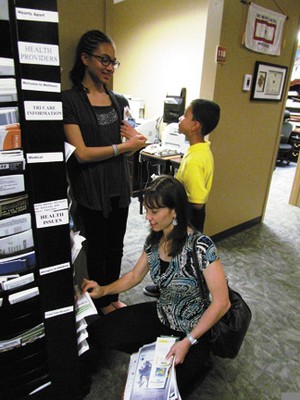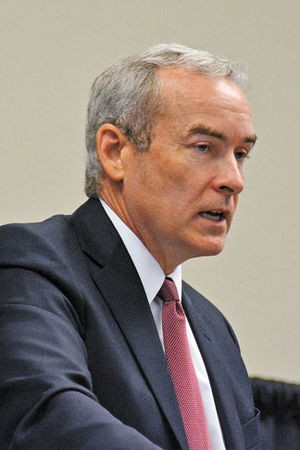Chicago to be named a model for financial education RocketNews
Post on: 16 Март, 2015 No Comment

Does Chicago have the key to teaching its citizens about money so they make better financial choices and live more prosperous lives?
The federal government thinks the city just might.
On Thursday, Secretary of Education Arne Duncan will dub Chicago the first model city for financial education, teaching money skills to kids in school and adults through community programs.
The model city designation honors Chicagos commitment to a proposed citywide program for addressing financial education on topics such as household budgeting, debt, credit and retirement saving and investing.
The Obama Administration has worked hard to ensure all students have a strong foundation and level playing field, no matter where they were born or where they live, Duncan said. Chicagos commitment to financial education furthers that vision by seeking to give children the tools and resources they need to make smart decisions now that will only benefit them the long-run.
Officials are aiming to develop the program by summer, with pilots to start in fall and full implementation within three years. The model city designation itself does not come with any federal money.
What makes the Chicago program different from hundreds of other efforts — there are 135 organizations in Chicago alone teaching financial education — is the coordination. The plan for the first time brings together all those factions, both private and public, including the treasurers office, Chicago Public Schools, the Department of Family Support Services, Chicago Public Libraries, City Colleges and the mayors office.
CPS credit rating takes hit Hal Dardick and Heather Gillers Chicagos bad week of financial news continued Friday, as a major rating agency downgraded Chicago Public Schools debt to just one level above junk status. Chicagos bad week of financial news continued Friday, as a major rating agency downgraded Chicago Public Schools debt to just one level above junk status. ( Hal Dardick and Heather Gillers ) >
Highly regarded University of Chicago economist Richard Thaler has compared financial educations application in the real world to driving-school students competing in the Indianapolis 500. He has cited research that concluded that financial education is laudable, but not particularly helpful. Although, in a 2013 column in The New York Times, he conceded, If we try enough approaches, and evaluate what works, we may improve such programs effectiveness.
The Chicago program, dubbed The Chicago Financial Education Initiative, aims to be different because it is a sustained, coordinated effort.
John Rogers, CEO of Chicago-based Ariel Investments and chairman of the Presidents Advisory Council on Financial Capability for Young Americans, likens financial education to learning a foreign language.
Taking a high school foreign-language class probably wont make you fluent. But learning the second language as a young child and persistently using it through your schooling years promotes fluency. In his own case, he recalls his father giving him stock instead of toys for Christmas, an early education in investing that made money concepts real for him.
Chicago treasurer Kurt Summers said the current way of teaching money is like having a potluck dinner without assignments, he said. If everyone is bringing appetizers, nobody is bringing the main course or dessert.
This coordination allows for the full meal to be provided to young people in Chicago, Summers said. Financial education, when targeted, when focused on the right concepts, does work.
In Chicago Public Schools, for example, financial education efforts are highly fractured among its 600-some schools, varying by programs and often depending on which financial-education sponsors are working with an individual school, said Marty Moe, CPS social science manager.
The inconsistency leads to overlap and gaps in the money topics covered and which students are exposed to them.
This will allow us to coordinate all these different projects, Moe said. It gives us a chance to think about how they feed into each other. Where does a program fit best?
The idea is largely to weave financial education into existing topics, such as math and social sciences, instead of tacking on separate course work.
We dont want to say, Here is one more thing you have to do during your school day, Moe said.
The plan will involve teaching teachers, not all of whom are comfortable with financial instruction, he said.

For other critics, some efforts sponsored by banks and investment firms amount to a branding campaign aimed at children.
Moe said CPS would not work with a company that just wanted to get a brand into Chicago schools. It would have to fit into bigger picture of what were trying to do, he said. For example, an existing personal finance course funded by Riverwoods-based Discover allows schools to dictate curriculum, Moe said.
Mario Gage, 23, of Chicago, said hes an example of how financial education at an early age can spark an interest and competency in money matters and, eventually, fuel a career.
He was a member of the 2006 graduating class at Ariel Community Academy, a CPS school that incorporated money and investing lessons into its curriculum. Gage said he was instantly intrigued and soon couldnt get enough of his investing classes, eventually joining an outside investment club at age 12 before pursuing a degree in economics from the University of Chicago.
Gage now works as an investment services associate at Ariel Investments.
The early exposure really matters, Gage said. This program really shaped me to be the person I am today.
Summers said the next step in launching the new financial education program is to develop a specific action.
An essential part will be determining how to measure whether Chicago actually becomes smarter about money as a result of the efforts — and whether its worthy of being a model city.
gkarp@tribpub.com
Twitter @spendingsmart














